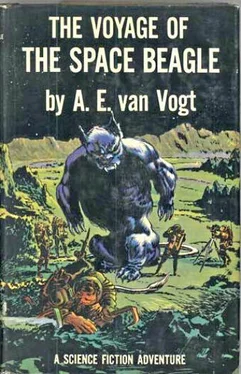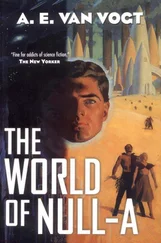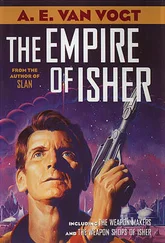He was not the only one who did just that. All over the room, men crouched or slumped in their seats — as Director Kent, in a single spasmodic movement, snatched his vibrator and fired it at his audience. It was not until Grosvenor had instinctively ducked that he saw that the tracer beam from the weapon pointed over his head, and not at it.
Behind him, there was a thunderous howl of agony, and then a crash that shook the floor.
Grosvenor whirled with the others, and stared with a sense of unreality at the thirty-foot armoured beast that lay squirming on the floor a dozen feet behind the last row of seats. The next instant, a red-eyed replica of the first beast materialized in mid-air and landed with a thud ten feet away. A third devil-faced monster appeared, slid off the second, rolled over and over — and got up, roaring.
Seconds later, there were a dozen of the things.
Grosvenor drew his own vibrator and discharged it. The bestial roaring redoubled in intensity. Metal-hard scales scraped metal wall and metal floors. Steely claws rattled, and heavy feet stamped.
All around Grosvenor now, men were firing their vibrators. And still more beasts materialized. Grosvenor turned and scrambled over two rows of seats, then leaped to the lowest platform of the instrument board. The Acting Director ceased firing as Grosvenor climbed up to his level, and yelled angrily, “Where the hell do you think you’re going, you yellow dog?”
His vibrator swung around — and Grosvenor knocked him down, mercilessly kicking the weapon out of his hand. He was furious, but said nothing. As he leaped to the next platform, he saw Kent crawling after the vibrator. There was no doubt in Grosvenor’s mind that the chemist would fire at him. It was with a gasp of relief that he reached the switch that activated the great multiple-energy screen of the ship, pulled it all the way over, and flung himself to the floor — just in time. The tracer beam of Kent’s vibrator impinged on the metal of the control panel where Grosvenor’s head had been. Then the beam snapped off. Kent climbed to his feet and shouted above the uproar, “I didn’t realize what you were trying to do.”
As an apology, it left Grosvenor cold. The Acting Director had evidently believed that he could justify his murderous action on the grounds that Grosvenor was running from the battle. Grosvenor brushed by the chemist, too angry to talk. For months he had tolerated Kent, but now he felt that the man’s behaviour proved him unfit to be director. In the critical weeks ahead, his personal tensions might act as a trigger mechanism that could destroy the ship.
As Grosvenor came down to the lowest platform, he again added the energy from his vibrator to that of the other men’s. From the corner of his eye, he saw that three men were wrestling a heat projector into position. By the time the projector’s intolerable flame poured forth, the beasts were unconscious from the molecular energy, and it was not difficult to kill them.
The danger past, Grosvenor had time to realize that these monstrous things had been transported alive across light-centuries. It was like a dream, too fantastic to have happened at all.
But the odour of burning flesh was real enough. And so was the bluish-grey beast blood that slimed the floor. The final evidence was the dozen or so armoured and scaly carcasses that were sprawled about the room.
When Grosvenor saw Kent again a few minutes later, the Acting Director was coolly and efficiently giving orders into a communicator. Cranes floated hi and began to remove bodies. Communicators buzzed with a criss-cross of messages. Swiftly, the whole picture clarified.
The creatures had been precipitated only into the control room. The ship’s radar registered no material object such as an enemy ship. The distance to the nearest star in any direction was a thousand light-years. All over the room, sweating men cursed as those scanty facts penetrated.
“Ten light-centuries!” Selenski, the chief pilot, said. “Why, we can’t even transmit messages that far without relays.”
Captain Leeth came hurrying in. He talked briefly to several scientists, then called a council of war. The commander began the discussion.
“I need hardly emphasize the hazard confronting us. We are one ship against what seems to be a hostile galactic civilization. For the moment we are safe behind our energy screen. The nature of the menace requires us to set ourselves limited, though not too limited, objectives. We must discover why we are being warned away. We must ascertain the nature of the danger and measure the intelligence behind it. I see our chief biologist is still examining our late adversaries. Mr. Smith, what kind of beasts are they?”
Smith turned from the monster he had been studying. He said slowly, “Earth could have produced something like their type during the dinosaur age. Judging by the minute size of what appears to be the brainpan, the intelligence must have been extremely low.”
Kent said, “Mr. Gourlay tells me the beasts could have been precipitated through hyperspace. Perhaps we could ask him to develop on that.”
Captain Leeth said, “Mr. Gourlay, you have the floor.”
The communications expert said in his familiar drawl, “It’s only a theory, and fairly recent at that, but it likens the universe to an expanded balloon. When you prick the skin, the balloon instantly starts to deflate, and simultaneously begins to repair the break. Now, oddly enough, when an object penetrates the outer skin of the balloon, it does not necessarily come back to the same point in space. Presumably, if one knew some method of controlling the phenomenon, he might use it as a form of teleportation. If all this sounds fanciful, remember that what has actually happened seems equally so.”
Kent said acidly, “It’s hard to believe that anyone is that much smarter than we are. There must be simple solutions to the problems of hyperspace, which human scientists have missed. Maybe we’ll learn something.” He paused, then said, “Korita, you’ve been singularly silent. How about telling us what we’re up against?”
The archaeologist stood up and spread his hands in a gesture of bewilderment. “I can’t even offer a guess. We shall have to learn somewhat more about the motivation behind the attack before we can make comparisons on the basis of cyclic history. For example, if the purpose was to seize the ship, then to assail us as they did was a mistake. If the intent was merely to scare us, the attack was a howling success.”
There was a flurry of laughter as Korita sat down. But Grosvenor noticed that the expression on Captain Leeth’s face remained solemn and thoughtful.
“As to motivation,” the captain said slowly, “one unpleasant possibility has occurred to me that we should be prepared to face. It fits the evidence to date. It is this: Supposing this potent intelligence, or whatever it is, would like to know where we came from?”
He paused, and from the way feet shifted and men stirred in their seats, it was clear that his words had struck a responsive chord. The officer went on. “Let’s look at it from — his — point of view. Here is a ship approaching. In the general direction from which it is coming, within ten million light-years, are a considerable number of galaxies, star clusters, and nebulae. Which is us?”
There was silence in the room. The commander turned to Kent. “Director, if it’s all right with you, I suggest we examine some of the planetary systems of this galaxy.”
Kent said, “I have no objection. But now, unless someone else….”
Grosvenor raised his hand. Kent continued, “I declare the meeting—” Grosvenor stood up, and said loudly, “Mr. Kent!”
Читать дальше











